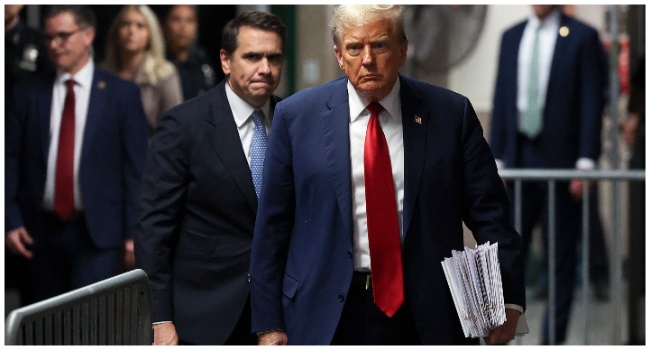In the 1990s, Donald Trump famously gossiped to the tabloids about — who else — himself, a headline-chaser who loved none other than to see his name in lights, or at least in the supermarket checkout line.
But those were Trump’s good old days, an era of clubs and models, long before he launched a bid for the US presidency and found himself needing to squash the lewd, party boy stories he once boasted about.
Cue David Pecker, the former publishing executive whose titles included the National Enquirer, and who on Tuesday in a Manhattan courtroom laid out the “catch and kill” strategy he carried out in a bid to support Trump’s 2016 presidential campaign.
In a then-secret meeting in August 2015, Trump and his former personal lawyer Michael Cohen met with Pecker to ask how he and his publications could “help the campaign,” the 72-year-old witness testified.
Speaking nonchalantly to the packed courtroom, Pecker, who will continue his testimony in the high-profile trial Thursday, recalled saying: “I would run or publish positive stories about Mr. Trump, and I would publish negative stories about his opponents.”
“I said that I would also be the eyes and ears” in service of the campaign, he added.
Under questioning from prosecutors, Pecker explained to jurors how along with pushing positive stories in his magazines, he would alert Cohen to any potentially damaging sources on the move.
In particular, the smooth-talking tabloid man said he thought “there would be a lot of women” who would be trying to sell stories about Trump, because the then-candidate “was well-known as the most eligible bachelor,” despite having married his third wife, Melania, in 2005.
Trump “dated the most beautiful women,” Pecker explained, “and it was clear that, based on my past experience, that when someone is running for a public office like this, it is very common for these women to call up a magazine like the National Enquirer to try to sell their stories.”
‘Fake news’ sells
Speaking under oath, Pecker, who sported a pink tie and slicked back hair, essentially confessed to trafficking so-called “fake news” to both his and Trump’s benefit, while simultaneously paying off several people whose tales had the potential to damage candidate Trump’s reputation.
He said “popular stories about Mr. Trump” as well as “negative stories about his opponents” would “only increase newsstand sales.”
“Publishing these types of stories was also going to benefit his campaign,” Pecker said. “Both parties benefited from it.”
Pecker offered a portal into the editorial practices of outlets like his own, which had no shame in paying for stories and focused far more on the cover than the content.
“We would do a lot of research to determine what… the proper cover of the magazine would be,” Pecker said.
“Every time we did this, Mr. Trump would be the top celebrity,” Pecker said, describing the magnate’s pre-politician days and pointing to his star turn as the top guy on his own reality show “The Apprentice,” and its celebrity-starring sequel.
In recalling Trump’s first campaign era, the prosecution presented bombastic headlines disparaging the Republican’s opponents, such as “Bungling surgeon Ben Carson left sponge in patient’s brain” and “Ted Cruz shamed by porn star.”
Pecker said such ideas often came from or were shaped by Cohen, Trump’s then-fixer who is expected to be a star witness in the New York state trial.
But Pecker also said he wanted to keep his “agreement among friends” with Trump and Cohen “as quiet as possible.”
Among the times he said he killed a story regarding Donald Trump, it centered on a Trump Tower doorman who was peddling a false claim that Trump had fathered a child out of wedlock with one of his former employees.
Pecker said he thought it was important to buy the story and keep it quiet for Trump’s benefit — as well as his own.
He said had the story been true, he planned to publish it “after the election.”
“If the story was true, and I published it, it would be probably the biggest sale of the National Enquirer since the death of Elvis Presley.”



